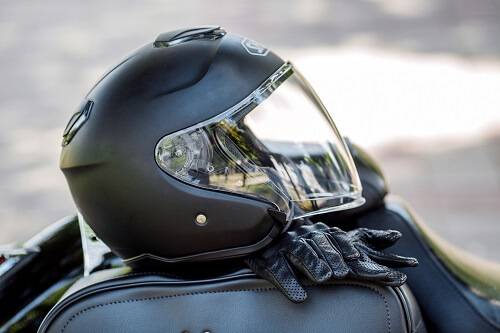Posted on 08/24/2022
Personal Injury and Employment Lawyers
Riding in The Golden State is one of the great joys we have most of the year. Whether you prefer bicycling or motorcycle riding, the freedom of the open road is always great. But an accident can derail those plans, especially without a helmet.
Many people don’t like to wear helmets, despite the benefits. However, California requires motorcycle riders to wear helmets, but not necessarily bicyclists.

California is one of nineteen states that has adopted a universal helmet law for motorcyclists. Riders must always wear a U.S. Department of Transportation (DOT) compliant motorcycle safety helmet in accordance with California Vehicle Code 27803. The law includes all motor-driven cycles (such as scooters) and motorized bicycles.
Police have the right to stop you for not wearing a helmet. If you’re caught without a helmet, you’ll be given a ticket with a fine of $250. Those fines increase if you commit other traffic violations, such as driving under the influence.
The helmet must fit the rider correctly, have no lateral or vertical movement, and have the chin straps fastened to comply with the law. If the chin straps aren’t fastened, this can still lead to a ticket.
After the 1992 implementation of the universal helmet law, California’s motorcycle accident fatality rate decreased by more than 37%. Additional studies show that riders who wear helmets and other protective gear can reduce their risks of injuries by as much as 80%. The CDC reports that helmets reduce the risk of head injury to a motorcyclist by 69%.
If you’ve been involved in a motorcycle accident while wearing your helmet, and your helmet is damaged, you’ll need to find a new one. But keep the old one as evidence for your case.
The California Vehicle Code, Article 4: Operation of Bicycles [21200 – 21213] requires any rider under 18 to wear a helmet while on public roads, trails, and bike paths. Passengers under 5 are also required to wear a helmet while in a bike stroller or trailer. There is no helmet requirement on private property, such as a driveway. Minors caught riding without a helmet can be fined $25, payable by the parent or responsible guardian.
Bicycle riders over 18 are not subject to the same requirement. Helmets are optional in California for riders over 18 except in cities with local rules that require helmets for adults. In El Cerrito, Bidwell Park, and the city of Chico, riders of any age can be fined $25 for not wearing a helmet—even if they’re not residents.
The helmets must meet the specific safety requirements of the United States Consumer Product Safety Commission (CPSC) or the American Society for Testing and Materials (ASTM). The official requirements are published in the Code of Federal Regulations (C.F.R) in Title 16, Part 1203.
A new report from the CDC shows that more adults are dying in bicycle accidents as well as visiting emergency rooms for traumatic brain injuries for the same reason. From 2009 through 2018, there were more than 597,000 adult traumatic brain injuries that resulted from bicycle accidents.
Aside from the legal requirement for them, wearing a helmet is proven effective in reducing serious head and facial injuries no matter what you’re riding. With both bicycles and motorcycles, the helmet absorbs much of the impact of a crash.
But there is another reason you may not consider if you decide to ride without one (illegally if it’s a motorcycle.) If you have an accident, your lack of a helmet can have a direct impact on your personal injury case later.
California tort law uses pure comparative fault when deciding on a settlement or award after a trial. This means that fault for an accident can be divided among the parties according to responsibility. The court considers the amount of responsibility each party has for the accident, with the percentages adding up to 100%. A person can collect damages even if he or she is found to be 99% responsible for an accident.
With a bicycle or motorcycle accident, a rider wearing a helmet may be entitled to a greater portion of damages, as much as 100%. But for a rider found not wearing a helmet, that amount may be reduced by the percentage of responsibility.
For instance, if a plaintiff were found to have no responsibility for the accident, they would be awarded 100% of the damages. But if a rider is found to be 30% responsible because they weren’t wearing a helmet, they would only be able to collect 70% of a settlement from the other party. A settlement of $50,000 becomes $35,000, or 70% of $50,000.
Not all helmets will prevent all injuries. But for riders of both motorcycles and bicycles, a helmet is your best defense against serious injuries after an accident.
We hope that you never have an accident while riding. Whether you’re riding a motorcycle or a bicycle, we encourage you to wear your helmet and safety gear every time you ride and make sure to follow all safety precautions on the road.
If you’ve been injured in a bicycle or motorcycle accident, it’s important to speak with an experienced personal injury attorney as soon as you can. Contact us online or call our office directly to schedule your free consultation with one of our personal injury attorneys. We have been helping motorcycle and bicycle accident victims since 2013 and serve clients throughout Southern California. You can also request our free Your Personal Injury Guide: 10 Things You Should Know About Your Personal Injury Case guide to learn more about these accidents.